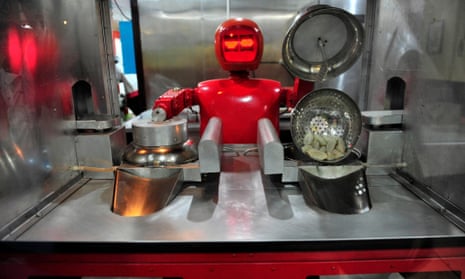It’s official: the robots are coming – and humanity needs a plan. Recently, Stephen Hawking warned that computers will overtake humans within 100 years, remarking: “Our future is a race between the growing power of technology and the wisdom with which we use it.” Some of the latest robots even look like humans – as seen with the mimetic Yangyang, who comes complete with lifelike facial expressions. Forget digital dreams of android butlers and cyborg chefs: we face the very real threat of robots taking over jobs previously reserved for humans.
Deloitte predicts that 35% of existing UK jobs are at high risk of automation. Currently, routine jobs paying less than £30,000 a year are five times more likely to be replaced than specialist skilled ones paying over £100,000, making it an issue that needs to be quickly addressed to ensure everyone has a chance of a life of rewarding work.
So what’s the answer? Well, as robots take on more responsibility and gain more autonomy, the importance of teaching coding has become much more apparent. Society hardly expects every child to become a doctor, yet it’s necessary for everyone to have a basic understanding of the human body.
Similarly, with the rise of robots, we need as many people as possible to grow up with a working knowledge of their technology. Once robots become an independent force to be reckoned with, it’s vital that enough humans understand how to program them, in order to align our goals and distinguish ourselves. Additionally, the more ubiquitous robots become, the more valuable becomes human innovation and experience.
Coding last year replaced ICT (under the banner of computer science) in UK schools. This welcome change will prepare new generations of students for their future in a progressively digital economy, resulting in a contemporary curriculum that encourages purposeful programming, facilitating careers in a digital economy. These benefits can be enjoyed by students from all social and academic backgrounds – digital skills are no longer reserved for senior computer science students nor coding holiday camp attendees. Young people can now become creative producers of technology, rather than passive consumers.
The brand new digital revolution is inspiring young people to craft their chosen futures through technology. Concurrently, there is a growing desire from teachers for more inter-disciplinary project-based learning. Teaching, after all, is about having the confidence to inspire young people with both creative and career possibilities; digital skills, through their cross-curricular nature, open up a multiplicity of such possibilities.
Coding is a creative subject – like music, it’s often seen as an intersection of creativity and maths, which explains why people who can read and write music often make excellent programmers. Coding is empowering because it’s building something from nothing with visual results. Essentially, coding is like writing a story. It’s meaningless in separate pieces, devoid of any flow, but when coded all together, a program is comprised of a beginning, middle, and end.
Consequently, while it’s great that coding has been added to the national UK curriculum, its creative benefits become more apparent in less formal learning environments. Such environments may take the form of volunteer-led after-school clubs or simply a pupil’s own time at home – ideally inspired by an introduction at school.
Indeed, Nesta’s recent Young Digital Makers report found that 82% of young people say they are interested in digital making – yet half make things with digital technology less than once a week, if ever. Considering there’s a big gap in the IT skills sector (it’s predicted that there will be 750,000 jobs to fill by 2017, and last year there were only 50,000 computer science graduates), this is something that needs to be improved over and above what has already been done in schools across the UK in the last 12 months.
At Kuato, we work with schools across the country, driving coding initiatives into classrooms. Fundamentally, teaching coding in schools isn’t about transforming pupils into programmers, just as teaching reading and writing isn’t aimed at turning them into published authors. Instead, it’s about equipping young people with tools to create innovative services and solutions to some of our future world’s biggest problems.
Ultimately, the AI and automaton communities will determine the extent to which robots pervade our everyday lives. In the meantime, teaching kids to code means more individuals will be inspired from a young age to become experts in coding, maximising our chances of managing these machines effectively, while providing an invaluable foundation for multi-disciplinary innovation. As for everyone else, a basic understanding of robots enables communication between civilians and automatons – which could save us all from a robotic takeover, instead fuelling a future workplace abundant with human creativity.
Mark Horneff is managing director, Kuato Studios
To get weekly news analysis, job alerts and event notifications direct to your inbox, sign up free for Media Network membership.
All Guardian Media Network content is editorially independent except for pieces labelled “Advertisement feature”. Find out more here.

Comments (…)
Sign in or create your Guardian account to join the discussion